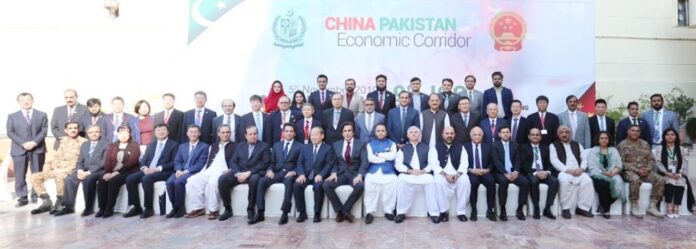- JCC approves Gwadar Master Plan, inaugurates Multan-Sukkur Motorway
- Chinese official says CPEC’s 2nd phase to focus on socio-economic and industrial cooperation
ISLAMABAD: The meeting of 9th Joint Cooperation Committee (JCC) of China Pakistan Economic Corridor (CPEC) concluded in Islamabad on Tuesday with both sides expressing satisfaction over the ongoing and planned projects under CPEC. However, no new mega project was included in the multibillion-dollar framework.
The 9th JCC discussed the proposals forwarded by six Joint Working Groups of the two countries, which included industrial cooperation, transfer of technology and cooperation in agricultural, mineral, oil and gas and steel sectors.
The major development in the 9th JCC was related to the much-awaited mega railway project, ML-I, which according to the planning minister would see practical development within the next 3 to 6 months.
“We will be able to perform the groundbreaking of the mega project in next 6 months as processes related to financing are being finalised with China,” the minister said while addressing a press conference along with Chinese Ambassador to Pakistan Yao Jing after the conclusion of 9th JCC in Islamabad.
The minister said the $9-billion project would provide facilities to both passengers and businessmen. He said that ML-1 was among the top priorities of Pakistan and that the stage was set to take the discussion to a next level and formulate a joint project financing group to discuss the project modalities.
He said that the government has established a CPEC Authority which would work as a one window for all CPEC-related issues so that the pace of the projects could be fast-tracked while bottlenecks could be removed for timely completion of the projects.
“Besides, development related to the planned eastern route of CPEC has been made,” the minister said without sharing further details of the projects. Bakhtiar said that remaining portion of the eastern corridor from Sukkur to Hyderabad (M6) would be completed on a BOT basis under the umbrella of public-private partnership, urging the Chinese companies to take an active part in the bidding process.
He said that JCC accorded a priority to the remaining portion western corridor and the provincial projects proposed in previous JCCs. “In March, the Zhob–Quetta section of the western corridor was inaugurated and now the portion of DI–Khan–Zhob is a priority for the government.”
Meanwhile, as reported earlier by this scribe, there was no discussion held on the much-delayed Karachi Circular Railway (KCR) during the 9th JCC despite the Sindh government’s request to make progress in this regard. However, the minister claimed that the mega project was “still a priority project” under CPEC.
The minister further claimed that development related to cooperation in steel sector has also been made where revival of Pakistan Steel Mills would be focused. “Definitely when we start the ML-I project, we will be in need of steel and PSM will be needed to be operationalised,” the minister maintained.
Assuring the Chinese side about improved security situation in Pakistan, the minister said that Pakistan is going to fence the long border with Iran along with the border with Afghanistan, which is being already fenced.
The fencing of Pak-Afghan border would be completed by 2020, he said.
THE JCC MEETING
The 9th JCC was co-chaired by Planning Minister Makhdoom Khusro Bakhtiar and Vice Chairman National Development & Reform Commission (NDRC) Ning Jizhe.
Balochistan Chief Minister Jam Kamal Khan, Khyber Pakhtunkhwa CM Mahmood Khan, Gilgit Baltistan CM Hafiz Hafeezur Rehman, Chinese Ambassador Yao Jing, provincial secretaries, visiting Chinese delegation and representatives of leading companies were present on the occasion.
During the proceedings, a ceremony was held wherein Multan-Sukkur Motorway of the eastern corridor was inaugurated. Gwadar Master Plan was also approved and signed. The ceremony also witnessed the signing of two MoUs; one between the All-China Federation of Trade Unions (ACFTU) and Ministry of Planning to further strengthen the workers’ exchanges and another on healthcare between ther Ministry of Health and the Research Development International (RDI).
Speaking on the occasion, Bakhtiar said that the government this year took several important decisions that paved way for finalization of Gwadar Master Plan, preliminary design of ML-1 project, operationalization of Gwadar Port and free zone.
“We made steady progress in the resolution of matters regarding finalization of tariffs for the completed energy projects, Gwadar port concession agreement and Kohala hydropower project,” the minister added.
He expressed optimism that today’s huddle would help formulate the roadmap for cooperation in the 2nd phase of CPEC and hoped that it would yield tangible progress towards the shared goal of making CPEC a resounding success.
Appreciating the warm welcome accorded by Pakistan, NDRC VC Ning Jizhe said that delegation from China for 9th JCC was the biggest as compared to previous delegations, which showed the commitment of China to taking cooperation with Pakistan to new heights.
He stated that high consideration would be given to socio-economic and industrial cooperation in the second phase of CPEC. He underscored that bilateral economic cooperation would proceed as planned for the mutual benefit of both brotherly countries.




